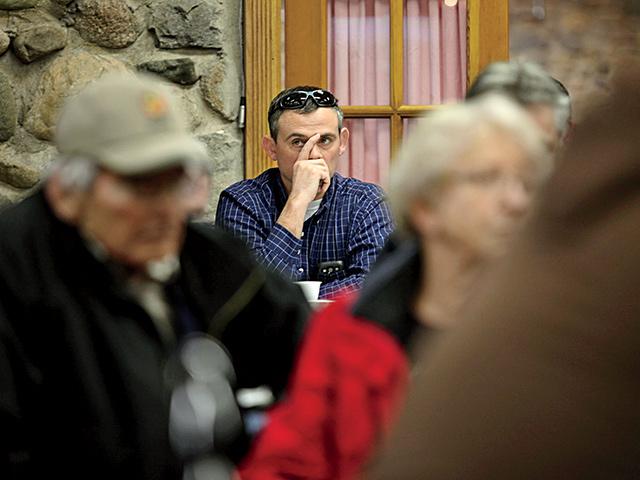MI Farmer Reaches Second Plea Agreement
Michael Stamp Pleads Guilty to Bank Fraud, Conspiracy to Make False Statements to FCIC
OMAHA (DTN) -- Decatur, Michigan, farmer Michael Stamp has pled guilty to bank fraud and conspiracy to make false statements to the Federal Crop Insurance Corp., according to a new plea agreement filed with a federal court on Sept. 24.
Stamp's sentencing on the charges is scheduled for Jan. 19, 2021, in the U.S. District Court for the District of Western Michigan. He could face up to eight years in prison.
Despite reaching plea deals on felony charges in April 2019 connected to a Chapter 11 bankruptcy, Michael and his wife, Melissa Stamp, were possibly heading to trial after a judge ruled an original plea agreement from Michael Stamp did not meet sentencing guidelines.
At the end of March 2020, Judge Paul L. Maloney granted a U.S. Department of Justice request to withdraw Melissa Stamp's agreement, as well, because it was contingent on Michael Stamp's guilty plea.
MAXIMUM PENALTY
The U.S. attorney's office and Stamp have agreed to a maximum penalty of eight years, according to the plea agreement. If the court accepts the agreement, the judge would be bound to issue the sentence. In addition, Stamp would agree to cooperate in any future investigations into the case. As a result, the U.S. attorney's office said in the agreement it could possibly file a motion to reduce Stamp's sentence.
Bank fraud comes with a maximum of 30 years in prison, a five-year supervised release period and a $1 million fine or twice the gross gain or gross loss from the offense, whichever is greater.
The maximum penalty for making false statements to the FCIC is five years in prison, a three-year supervised release period and a fine of $250,000 or twice the gross gain or gross loss from the offense.
In addition, the U.S. attorney's office would agree to seek dismissal of the charges against Melissa Stamp.
P[L1] D[0x0] M[300x250] OOP[F] ADUNIT[] T[]
TIED UP IN COURT
The Stamps' legal cases have been tied up in court since they filed bankruptcy on their farm operation in late 2012. At one time, the couple's farming operation encompassed a reported 27,000 acres, though they were accused of claiming even larger acreage to secure operating loans.
Michael Stamp originally pled guilty to conspiracy to commit bank fraud and providing false statements.
Melissa Stamp pled guilty in federal court in June 2015 to misprision of felony -- failure to report a crime to authorities and potentially helping conceal it. She was sentenced to 20 months in jail, 20 months of supervised release and was required to pay restitution for her role in alleged bankruptcy fraud.
On Dec. 13, 2017, a federal grand jury handed down an indictment of Michael Stamp and two other men in connection with the Stamp Farms Chapter 11 bankruptcy filed in November 2012. The bank found Stamp Farms in noncompliance on loan agreements, including working capital and other ratios. Michael Stamp is the former owner of the farm.
In addition, James Leonard Becraft Jr. pleaded guilty to conspiracy to make false statements on crop insurance forms in the Stamp Farms case. On Feb. 12, 2019, he was sentenced to a year in prison, a two-year supervised release and ordered to pay $648,188 in restitution to the Risk Management Agency in Kansas City, Missouri.
Becraft has since asked the federal court to reduce the restitution amount, claiming his legal counsel was ineffective.
HUGE BANKRUPTCY
The Stamp Farms bankruptcy case left southwestern Michigan landowners and creditors jolted by what legal experts believe was, at the time, the largest grain farm bankruptcy in U.S. history.
According to the December 2017 indictment, the losses alleged in the fraud total about $60.5 million.
According to court documents in Stamp's individual bankruptcy case, Wells Fargo claimed it had made a $68 million loan in December 2011 based on representations that Stamp Farms and its affiliates farmed 46,000 acres. Audits later could uncover only about 27,000 acres, the bank claimed.
The indictment said Stamp rapidly increased the number of acres the company farmed by acquiring agricultural land leases from landowners in southwest Michigan, "often by paying above-market rates."
Over the years, Stamp relied on "large" operating loans and credit agreements. In addition, the indictment said, Stamp used crop insurance payments to pay for some of his operation, including covering lease payments.
NEEDED MONEY
Starting in 2011, Stamp needed money to keep his farm going and to pay off an outstanding loan. Between March and December of that year, Stamp allegedly provided false information to obtain about $68 million in credit from Wells Fargo by misrepresenting the amount of land he farmed and the value of his farming assets, the grand jury said.
According to the indictment, when the bank extended his credit, Stamp allegedly continued to provide false information about his operation. In addition, Stamp allegedly submitted false claims to the Federal Crop Insurance Corporation in order to get crop insurance payments.
Todd Neeley can be reached at todd.neeley@dtn.com
Follow him on Twitter @toddneeleyDTN
(c) Copyright 2020 DTN, LLC. All rights reserved.




